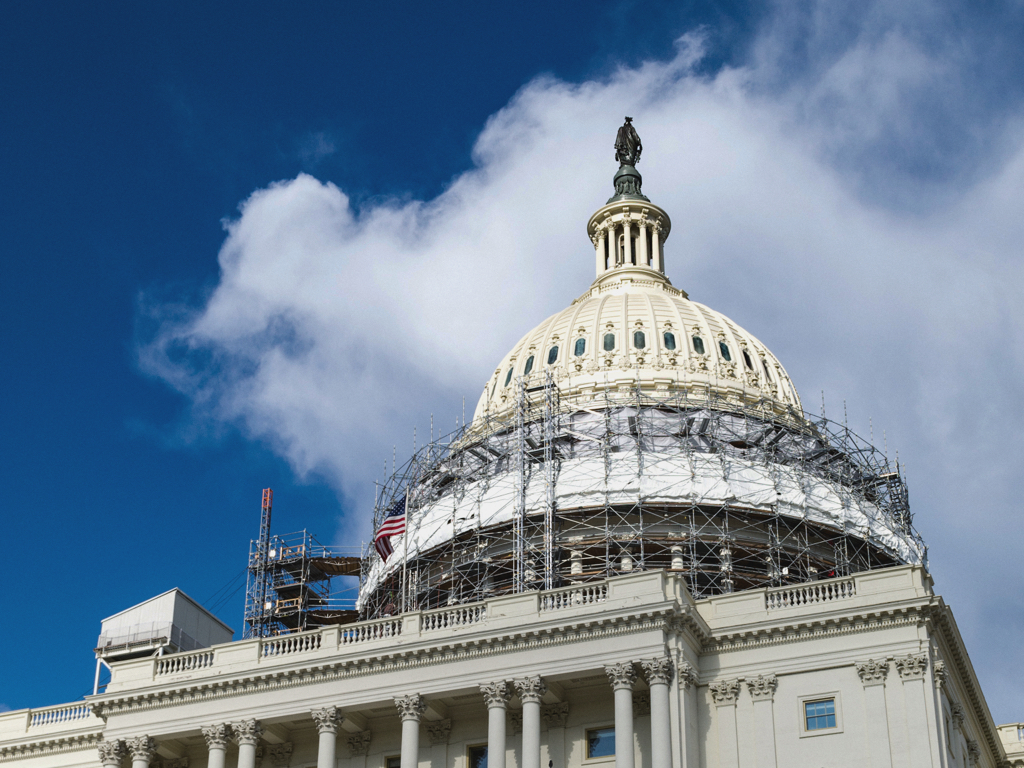Lyceum Labs is working to resolve a paradox that lies at the center of our politics and drives many of the problems we face.
On the one hand, most Americans find themselves in an expansive group that More in Common calls the Exhausted Majority. This group holds ambivalent and more pragmatic views on politics. It falls between the more sharply defined stances espoused by smaller camps of ideologues on the right and left, respectively.
On the other hand, it seems most of our political leaders come from the ranks of either one or the other of the activated, ideological poles, not the majority of Americans that sits in between them. The middle appears to be missing, or is at least increasingly under-represented, among our politicians.
Is there any way to fix the apparent mismatch between the disposition of most Americans and their political leaders? We think there is. To lay out our theory of the case, we need to begin by acknowledging the perceptions and reality that give rise to the problem.
The missing middle
We should start with the media and the audience it plays to, i.e., us–at least those of us with an appetite for political media. We are drawn to conflict and outrage. What plays better on cable news: a politician recounting prosaic negotiations over policy, or an incendiary partisan ripping into her opponents?
A recent study commissioned by Starts With Us confirms our intuitions. It found media coverage of the most hyper-partisan members in the House of Representatives outstrips that of the most bipartisan problem-solvers by a ratio of four to one.
In politics, perceptions tend to become facts on the ground. American politics now has disproportionately fewer pragmatists and more ideologues holding office. Moderates are less apt to run for political office, and to run for re-election, than their more partisan peers. Put another way, we have fewer productive work horses and more performative show horses.
Political scientists Danielle Thomsen of Syracuse University and Andy Hall of Stanford University have documented this is the case and developed persuasive explanations for how and why it has come to pass. Relative to ideologues, moderates find the value of holding office, especially when it comes to their prospects for influencing policy, to be lower in our polarized politics.
Meanwhile, the costs of being a politician, which increasingly include subjecting oneself to highly partisan attacks, and fighting back in turn (or not), are mounting. The shifting cost-benefit ratio dissuades moderates especially, even as it attracts people who relish the chance to take up the partisan cudgels against their enemies.
One common response to the hollowed-out middle is to advocate electoral reforms that would, in theory, put moderates on a more equal footing with ideologues. Frequently proposed ideas include, for example, nonpartisan redistricting, open primaries, ranked-choice voting, Alaska’s final four system, proportional representation, etc.
On the face of it, these are not inherently bad proposals. We certainly aren’t opposed to electoral reforms, provided they can be developed, implemented, and sustained organically, in the context of each state’s distinct political culture, party balance, and electoral institutions.
Practically speaking, however, this means efficacious electoral reforms that work as intended and disproportionately benefit moderate candidates will remain rare. Waiting to change the rules of the game to change our politics is like waiting for Godot.
Leading to govern
In the meantime, while we wait, we should focus on changing politics in the here and now, insofar as we can. Despite what the polarization-industrial complex would have you believe, we are not yet persuaded it is much more difficult, let alone impossible, for pragmatic and productive politicians to flourish. We think they still have ample room to maneuver. This is even more the case at the local and state level, outside the Thunderdome of our national politics, where most future members of Congress get their starts.
Our hypotheses have been bolstered by the initial phase of the Leading to Govern project, which we are undertaking in partnership with Emily Cherniack, founder and CEO of New Politics. Emily and I just completed the initial phase of this effort. It involved in-depth conversations with a dozen state and local politicians representing both parties and a broad swath of the country’s demographic and geographic diversity.
Our conversation partners were, however, unrepresentative in two respects. First, while they all are members of a party, and don’t shy away from representing its point of view, they wear their partisanship lightly. It takes a backseat to their goals for making a difference. Second, they also are good at their profession, which is governing and getting stuff done for the people they represent.
We skewed our sample of interviewees intentionally. We wanted to learn more about why they have been drawn to political leadership despite the headwinds, and what they see as the key factors behind their success. While we are still reflecting on and making sense of what we heard in these early conversations, some themes are already emerging, including:
- Opportunities to lead and make a positive difference abound–provided you are a strategic, determined, reflective, and public-spirited politician. Many (most?) electeds don’t hit all four of these thresholds. Those that do can have an outsized impact.
- It really helps to have a vision and an intentional approach–something you aspire to accomplish in and through politics, as well as an intentional set of leadership practices you can apply to make progress toward your goal.
- You can get ahead and get things done with integrity in politics. It’s important to set some guardrails in place, to be self-aware, and to grapple with and make periodic hard choices. But the job is not inherently corrupting or cynical. Good people can do it well.
- Fundraising can be daunting at first, but then the flywheel gets turning. Most effective politicians find methods to more or less automate it (though it still takes time). But it is not necessarily the endless, cynical, and corrupting exercise it is often portrayed as.
- It is not easy but really essential to protect family and personal time. Politics is a marathon, not a sprint. Rising generations of leaders don’t want to sacrifice in the same way older generations have. Clear obligations and boundaries to protect them can help.
Where we go from here
Our goal for the Leading to Govern project is to change–or at least complicate–the prevailing narrative about politics. It needn’t inevitably center on partisanship, gridlock, cynicism, and / or corruption.
We want to change the story for a particular audience: potential leaders in their twenties and thirties, most of whom subscribe to this conventional wisdom. They see politics as the last thing they would want to pursue as a vocation; they seek instead to make their mark on the world through business or nonprofit ventures.
We want the talented prospective leaders currently sitting on the sidelines of our democracy to realize that, in a free and dynamic society like ours, politics is an honorable profession. It can be challenging in the best ways, and when done right, represent the highest calling for a citizen to pursue. We want more people in this group of potential leaders to lower their defenses and consider raising their hands and running for office in ways, and at rates, they currently are not.
We are still working out how best to get the word out to our target audience. Sharing stories that show how leaders with values, profiles, and perspectives like their own are succeeding in politics could help. We expect that at least some of the current patterns of media coverage will have to change, or new ones develop, for reality to break through. But we are determined to solve this puzzle.
It is a daunting task, but we are not going it alone. We have stellar allies, beginning with our friends at New Politics. We are also encouraged by the work of partners at the Center for Effective Lawmaking, the Levin Center for Oversight and Democracy, and the Millennial Action Project. These nonprofits share our views on the importance and potential impact of outstanding politicians in state houses across the country working on a bipartisan basis. We’ve already joined forces to lift up the work of elected leaders they have identified as being truly excellent at what they do, and we look forward to collaborating further.
Along similar lines, we’ve also come to appreciate the work of organizations like The NewDEAL and the Rainey Center’s Leadership Alliance for a More Perfect Union. They are supporting rising cohorts of dynamic, problem solving leaders on the left and right respectively who are determined to get good things done. Many of the leaders they have enrolled are exemplars of the approach we are convinced we need more of.
We will keep you posted on these collective and collaborative efforts to recruit and support a cadre of political leaders who represent the concerns and perspectives of the Exhausted Majority. We are glad to be in their corner; a lot is riding on their success.



